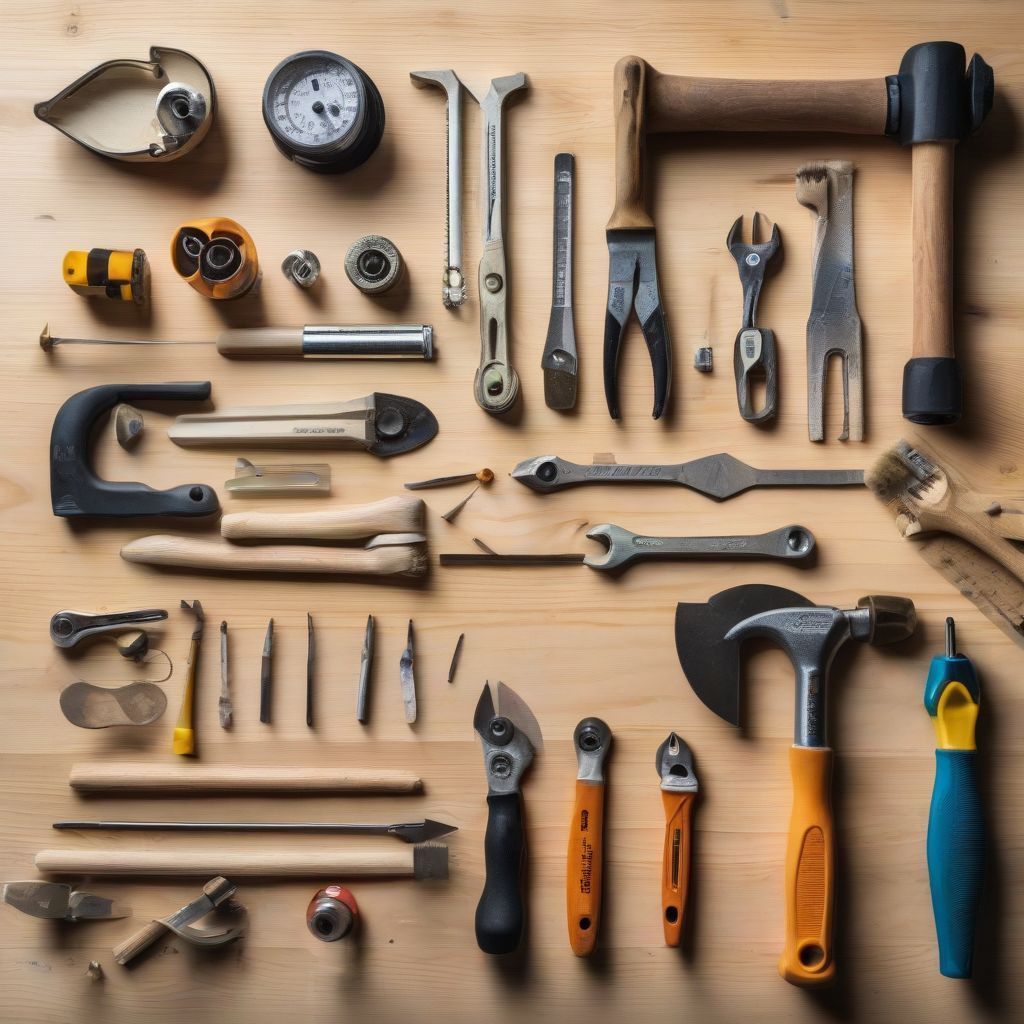Have you ever embarked on a DIY project and felt overwhelmed by the sheer number of tools available? As a nutritionist, I understand the feeling of being bombarded with options. Just as a well-stocked kitchen is crucial for healthy eating, the right tools are essential for successful DIY endeavors.
Whether you’re a seasoned DIYer or just starting, having the best tools can make your projects smoother, more efficient, and even more enjoyable. That’s why I’ve put together this comprehensive guide, drawing on expert reviews and recommendations to help you choose the perfect tools for your next project.
Essential Hand Tools: Your DIY Foundation
Every DIYer needs a core set of reliable hand tools. These are the workhorses of your toolkit, coming in handy for a wide range of tasks:
1. Claw Hammer: The All-Around Champion
A good claw hammer is non-negotiable. Look for one with a comfortable grip and a balanced weight for driving nails and prying wood.
Pro Tip: Opt for a smooth-faced hammer to avoid marring your work surface.
2. Screwdrivers: A Dynamic Duo
Having both Phillips and flat-head screwdrivers in various sizes is essential. Consider investing in a set with interchangeable bits for added versatility.
Pro Tip: Magnetized tips are a lifesaver for holding screws in place.
3. Tape Measure: Precision is Key
Accurate measurements are crucial in DIY projects. Choose a tape measure with a sturdy locking mechanism and clear markings.
Pro Tip: A tape measure with both metric and imperial units offers flexibility.
4. Level: Keeping Things Straight
From hanging pictures to building shelves, a level ensures your projects are perfectly aligned.
Pro Tip: A torpedo level is ideal for tight spaces, while a longer level provides greater accuracy over larger areas.
5. Utility Knife: The Versatile Cutter
From opening boxes to scoring drywall, a sharp utility knife is indispensable. Look for one with a comfortable grip and easy blade replacement.
Pro Tip: Always use a sharp blade for optimal safety and performance.
Power Up Your Projects: Essential Power Tools
While hand tools provide a solid foundation, power tools can significantly speed up your DIY projects and tackle more demanding tasks.
1. Cordless Drill: A DIY Essential
A cordless drill is a versatile tool for drilling holes, driving screws, and even sanding. Choose one with variable speed settings and a comfortable grip.
Pro Tip: Invest in a drill with two batteries, so you always have one charged and ready to go.
2. Circular Saw: Making Straight Cuts
A circular saw is invaluable for making long, straight cuts in wood. Look for one with a blade guard and a comfortable handle.
Pro Tip: Always use a guide when operating a circular saw to ensure straight, accurate cuts.
3. Jigsaw: Tackling Curves and Intricate Cuts
For curved cuts and intricate designs, a jigsaw is your go-to tool. Choose one with variable speed settings and orbital action for smoother cuts.
Pro Tip: Use the correct blade for the material you’re cutting to prevent damage to the tool or your workpiece.
4. Random Orbital Sander: Smoothing Out the Rough Edges
A random orbital sander is essential for achieving smooth, professional-looking finishes. Look for one with variable speed settings and dust collection capabilities.
Pro Tip: Use progressively finer grits of sandpaper to achieve a flawless finish.
5. Shop Vacuum: Keeping Your Workspace Clean
A shop vacuum is crucial for cleaning up sawdust, debris, and even liquids in your workspace. Choose one with powerful suction and a variety of attachments.
Pro Tip: Empty the vacuum regularly to maintain optimal performance.
 DIY Tools Arrangement
DIY Tools Arrangement
Choosing the Right Tools: Factors to Consider
With so many options available, choosing the right tools for your DIY projects can seem daunting. Here are some key factors to consider:
1. Project Needs: Defining Your Requirements
Start by identifying the specific tasks and projects you’ll be undertaking. This will help you determine the essential tools you’ll need and the features to prioritize.
2. Budget: Setting Realistic Expectations
Set a budget for your tools and stick to it. Prices can vary widely, so it’s essential to balance quality with affordability.
3. Brand Reputation: Trusting the Experts
Opt for reputable brands known for producing durable, reliable tools. Research online reviews and seek recommendations from experienced DIYers.
4. Features and Functionality: Tailoring to Your Needs
Consider the specific features and functionality that would be most beneficial for your projects, such as variable speed settings, cordless capabilities, and ergonomic design.
5. User Reviews: Learning from Others’ Experiences
Reading online reviews from other DIYers can provide valuable insights into the performance, durability, and overall satisfaction of different tools.
Resources for DIYers: Expanding Your Knowledge
Embarking on DIY projects can be a rewarding experience. Here are some resources to further enhance your DIY journey:
-
DIY Home Projects Hub: How to Choose the Right Contractors for Your Renovation provides valuable guidance on navigating the renovation process.
-
Online DIY Communities: Engage with fellow DIYers on forums and social media groups to exchange tips, seek advice, and share your projects.
-
YouTube Tutorials: Countless YouTube channels offer step-by-step instructions and demonstrations for a wide range of DIY projects.
Conclusion: Empowering Your DIY Success
Having the right tools can transform your DIY experience, making projects more enjoyable, efficient, and successful. By following this comprehensive guide and considering your specific needs, you’ll be well-equipped to tackle any project that comes your way.
Remember, always prioritize safety by wearing appropriate protective gear and following the manufacturer’s instructions for each tool.
Now that you’re armed with knowledge about the best tools for DIY projects, what will you create next? Share your DIY aspirations and any questions you have in the comments below.
[amazon bestseller=”diy tools”]
